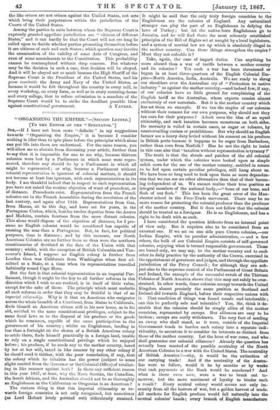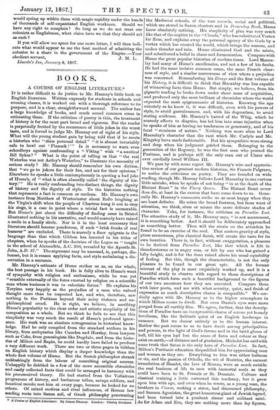"ORGANIZING THE EMPIRE."—[SEcorrn LETTER.] ETO THE EDITOR OF THE "SPECTATOR."]
SIR,-If I have not been more " definite " in my suggestions towards "Organizing the Empire," it is because I consider nothing is idler than to spin plans before the principles which alone can put life into them are understood. For the same reason, you will allow me to abstain from discussing your article, further than to say that it is impossible for one to see why, because thirteen colonies were lost by a Parliament in which none were repre- sented, therefore any should be by a Parliament in which all might be represented ; or why, because a Parliament without colonial representation is ignorant of colonial matters, it should not become at least less ignorant, with such representatives in its body. I am thankful indeed that in respect to such representation you have not raised the routine objection of want of precedent, or of distance. Precedents exist. Representatives from the French colonies sat in the French Assemblies during the revolution of the last century, and again after 1818. Representatives from Goa, from Macao, sit to this day, and have sat for years, in the Portuguese Cortes, which, besides twelve deputies from the Azores and Madeira, contain fourteen from the more distant colonies. This alone would dispose of the objection of distance, for I pre- sume no English colonist would be considered less capable of crossing the seas than a Portuguese. But, in fact, for political purposes, time is distance ; and by this measure, our North American Colonies are no further from us than were the northern constituencies of Scotland at the date of the Union with that country; whilst, with the exception of British Columbia and Van- couver's Island, I suppose no English colony is further from London than was California from Washington when first ad- mitted as a State, at a time when its representatives travelled habitually round Cape Horn.
But the fact is that colonial representation in an imperial Par- liament, though it might be the key to all further reforms in this direction which I wish to see realized, is in itself of little value, except for the sake of these. The principle which must underlie all such reforms in order that they may be fruitful is that of an imperial citizenship. Why is it that an American who emigrates across the whole breadth of a Continent, from Maine to California, finds himself an American citizen still in his new home, as in his old, entitled to the same constitutional privileges, subject to the same fiscal laws as to the disposal of his produce or the goods which he consumes, capable of the same participation in the government of his country ; whilst an Englishman, landing in less than a fortnight on the shores of a British American colony to settle there, finds himself practically in a foreign land, unable to rely on a single constitutional privilege which he enjoyed before ; his produce, if he sends any to the mother country, taxed by her at her will, taxed in like manner by any other colony if he should send it thither, with the poor consolation, if any, that the colony which he inhabits has the power (subject to some slight control from the Governor or the Colonial Office) of retaliat- ing in like manner against both ? Is there any sufficient reason in this year 1867, at least, why the Nova Scotian, the Canadian, the South African, and the Australian should not be as thoroughly an Englishman as the Californian or Oregonian is an American ?
The curious thing is that this imperial citizenship as to- wards foreign countries is not only recognized, but sometimes (as Lord Hobart lately pointed out) ridiculously strained. It might be said that the only truly foreign countries to the Englishman are the colonies of England. Any naturalized stranger can play the part of an Englishman in defying the laws of Turkey ; but let the native-born Englishman go to Jamaica, and he will find there the most solemnly established principles of the Bill of Rights set at naught by a local legislature, and a system of martial law set up which is absolutely illegal in the mother country. Can these things strengthen the empire ? Must they not enfeeble it ?
Take, again, the case of import duties. Can anything be more absurd than a war of tariffs between a mother country and its colonies ? Yet such a war has been threatened or begun in at least three-quarters of the English Colonial Em- pire—North America, India, Australia. We are ready to shrug our shoulders over the Australian cry of "Protection to native industry" as against the mother country,—and indeed few, if any, of our colonies have so little ground for complaining of the English tariff as the Australias, whose exports consist almost exclusively of raw materials. But it is the mother country which has set them an example. If we tax the staples of our colonies without their consent for our own purposes, why should not they tax ours for their purposes ? Admit once the idea of an equal citizenship, and such taxation becomes monstrous on both sides. Its enormity is veiled in certain cases, as sugar or tobacco, by countervailing excises or prohibitions. But why should an English farmer see a heavy duty levied without his consent on his produce in British ports because it happens to be sugar from Barbadoes, rather than corn from Norfolk ? Has he not the right to insiat in this case also that taxation without representation is tyranny?'
The truth is that the shreds and patches of the old colonial system, under which the colonies were looked upon as simple nffich cows for the use of the mother country, entitled in return to be fed upon certain peculiar privileges, still hang about us. We have been so long used to look upon them as mere dependen- cies that we can see no other alternative than that of their becom- ing independent of us. We cannot realize their true poeition as integral members of the national body,—" bone of our bone, and flesh of our flesh." This has been the great error of the Man- chester school in the Free-Trade movement. There may be no more reason for protecting the colonial producer than the producer of the mother country. But it does not follow that the colonist should be treated as a foreigner. He is an Englishman, and has a right to be dealt with as such.
I have considered the question hitherto from an internal point of view only. But it requires also to be considered from an external one. If we set on one side pure Crown colonies,—our Indian Empire, with its peculiar administration, — and a few others, the bulk of our Colonial Empire consists of self-governed colonies, enjoying what is termed responsible government. These are bound only, we may say, to the mother country and to each other in daily practice by the authority of the Crown, exercised in the appointment of governors and judges, and through the appellate jurisdiction of the Privy Council ; for although they are sub- ject also to the supreme control of the Parliament of Great Britain and Ireland, the example of the successful revolt of the Thirteen Colonies of North America shows that this may not safely be over- strained. In other words, these colonies occupy towards the United Kingdom almost precisely the same position as Scotland and Ireland did towards England, before their respective unions with it. That condition of things was found unsafe and intolerable ; can this be perfectly safe and tolerable? You, Sir, think it de- sirable that the colonies should be simply allies of the mother countries, represented by envoys. But alliances are easy to be broken ; envoys are easily withdrawn. The very fact of sending an envoy who shall stand, as it were, outside of the Imperial Government tends to harden each colony into a separate indi- viduality, to accustom it to consider its interests as distinct from those of the mother country. Let the hour of war come, and who _ shall guarantee our colonial alliances ? Already the question has actually been mooted of the possible neutrality of the North American Colonies in a war with the United States. The neutrality of British America !—why, it would be the extinction of our carrying trade! And if the neutrality of the Austra- lias were to follow, would it be by months or by weeks that cash payments at the Bank would be numbered? And what is there even now, were a war to break out to- morrow, but the mere sentiment of loyalty to hinder such a result? Every neutral colony would secure not only im- munity from all the horrors of war, but a golden harvest of trade. All markets for English produce would fall naturally into the neutral colonies' hands; every branch of English manufacture
-would spring up within them with magic rapidity under the hands -of thousands of self-expatriated English workmen. Should we have any right to complain? So long as we do not treat our -colonists as Englishmen, what claim have we that they should act as such ?
If you will allow me space for one more letter, I, will then indi- cate what would appear to me the beat method of admitting the colonies to a share in the government of the Empire.—Your































 Previous page
Previous page